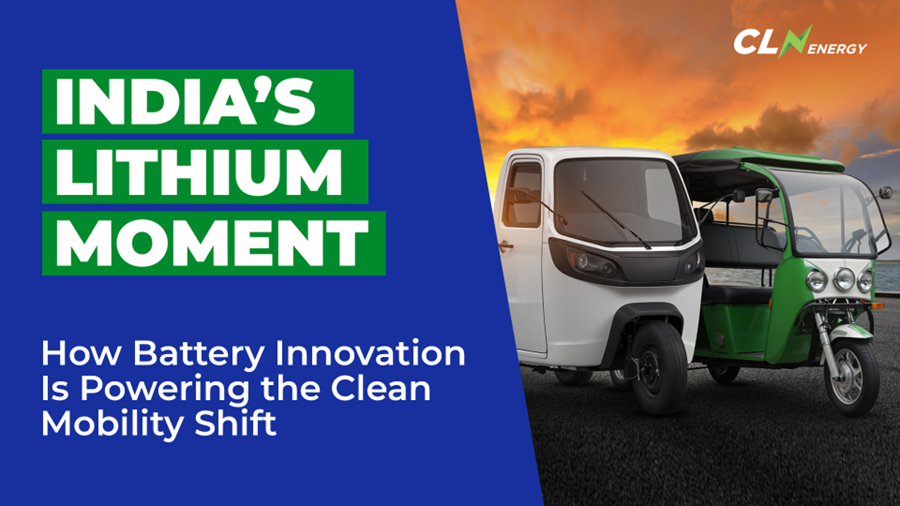
India stands at the cusp of a transformative era in transportation, driven by the urgent need to reduce carbon emissions and the global pivot towards sustainable energy solutions. Central to this shift is the lithium-ion (Li-ion) battery, a technology that underpins the burgeoning electric vehicle (EV) industry. As the nation accelerates its EV adoption, the focus on Li-ion battery innovation becomes paramount, not only to meet domestic demand but also to position India as a global leader in clean mobility.
The Indian EV market is experiencing exponential growth, fueled by government incentives, technological advancements, and increasing environmental awareness. According to Grand View Research, the market was valued at USD 8.49 billion in 2024 and is projected to grow at a CAGR of 40.7% from 2025 to 2030.
- Government Initiatives: Schemes like FAME II and the Production Linked Incentive (PLI) are providing financial incentives and support for EV adoption and manufacturing.
- Environmental Concerns: Rising pollution levels and climate change awareness are pushing consumers towards cleaner transportation options.
- Technological Advancements: Improvements in battery technology are enhancing the performance and affordability of EVs.
Li-ion batteries are critical for the performance, range, and efficiency of EVs. Their high energy density, long cycle life, and decreasing costs make them the preferred choice for EV manufacturers.
Projected Demand:
Year Estimated Li-ion Battery Demand (GWh)
2025 15
2030 127
2033 250–500
At CLN Energy Limited, we are proud to be at the forefront of India’s lithium-ion battery innovation, playing a vital role in driving the country’s clean mobility transition. By focusing on advanced battery technology and expanding our domestic manufacturing capabilities, we are directly addressing the key challenges of India’s “Lithium Moment” — from ensuring supply chain security to enhancing battery performance and reducing costs. Our commitment to producing high-quality lithium-ion batteries and developing robust charging infrastructure is helping accelerate EV adoption nationwide. Through strategic innovation and infrastructure investments, we at CLN Energy are dedicated to transforming India’s mobility landscape and enabling a cleaner, greener future for all.
The Indian government has implemented several policies to promote EV adoption and battery manufacturing:
- FAME II Scheme: Provides subsidies for electric two-wheelers, three-wheelers, and buses to encourage faster adoption.
- Production Linked Incentive (PLI) Scheme: Offers financial incentives to boost domestic manufacturing of advanced automotive technology products, including Li-ion batteries.
- Customs Duty Exemptions: Reductions in import duties for key battery components like lithium and cobalt to lower production costs.
- Electric Mobility Promotion Scheme (EMPS): Introduced to boost electric two- and three-wheelers with an allocation of INR 500 crore.
A robust charging infrastructure is essential for widespread EV adoption. As of February 2024, India has 12,146 operational public EV charging stations. However, to meet the projected demand, the country needs to establish at least 1.32 million charging stations by 2030, requiring over 400,000 installations annually.
State Initiatives:
- Uttar Pradesh: Leading in EV registrations with over 400,000 EVs, primarily e-rickshaws. The state plans to install more than 300 new charging stations across 16 municipalities.
- Tamil Nadu: Emerging as a hub for EV charger manufacturing, with companies like Delta Electronics India and Eaton expanding their offerings to include fast-charging solutions.
While the prospects are promising, several challenges need addressing:
- Raw Material Dependency: India currently imports a significant portion of its Li-ion battery components. Developing domestic sources or securing international partnerships is crucial.
- Infrastructure Gaps: The EV-to-charger ratio in India is currently 135:1, far from the ideal 6–20:1. Expanding charging infrastructure is imperative.
- Financing Hurdles: The EV financing ecosystem in India faces structural issues, making it difficult for consumers and businesses to access affordable financing options.
India's "Lithium Moment" is more than a technological shift; it's a transformative movement towards a sustainable future. With concerted efforts from the government, industry players like CLN Energy Limited, and the public, India is well on its way to becoming a global leader in clean mobility. The road ahead is challenging, but with innovation, collaboration, and commitment, the destination is within reach.
References
1. Grand View Research: India Electric Vehicle Market Analysis (grandviewresearch.com)
2. Economic Times: Lithium-ion battery demand in India to grow to 127 gigawatt hour by FY30 (auto.economictimes.indiatimes.com)
3. S&P Global: India’s EV Market: Trends and Future Prospects (spglobal.com)
4. Times of India: UP races ahead of Delhi, Maha, tops country in EVs (timesofindia.indiatimes.com)
5. Economic Times: Why it's time to mend India's broken EV financing ecosystem (economictimes.indiatimes.com)
6. CLN Energy secures $5 million lithium battery, related products order from Singaporean company (pv-magazine-india.com)

Comments: